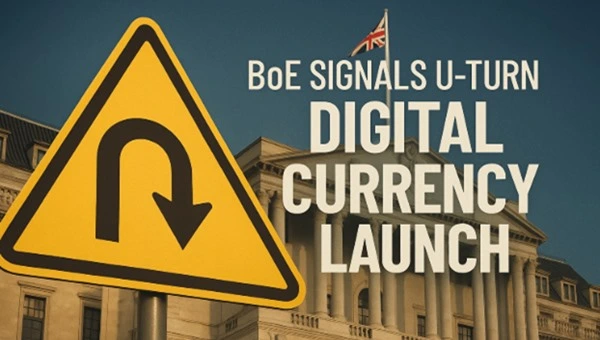The Motivation
The central bank’s original motivation was clear: modernize payments, reduce costs, and stay ahead of fintech disruption. But today, commercial players appear to be delivering much of that innovation themselves. From tokenized bank deposits to next-generation e-wallets, the private sector is producing real alternatives to state-issued digital cash.
BoE Governor Andrew Bailey made that view explicit in a recent address to Parliament. He suggested the case for a CBDC was growing weaker, not stronger, and said he’d need to be “a lot more convinced” before greenlighting a launch.

Public response has also weighed heavily. Over 50,000 submissions during the BoE’s consultation process raised one loud and recurring concern: privacy. Citizens remain wary of government-issued money that could, in theory, track or restrict transactions. Ensuring anonymity while enforcing anti-fraud measures would require new laws and complex technical solutions.
The bank is taking these concerns seriously. Without robust privacy guarantees, public support will remain fragile, and any future rollout would face political and legal resistance.
The UK isn’t alone in rethinking its approach. Around the world, retail CBDC projects have stalled or floundered. Nigeria’s e-naira failed to gain traction, with users preferring dollar-backed stablecoins. In the United States, Congress has moved to block a digital dollar altogether, through the CBDC Anti-Surveillance State Act (H.R. 5403), citing fears of surveillance and overreach. Even in the Eurozone, enthusiasm has been mixed despite progress on the digital euro.
Against this backdrop, the BoE’s pause looks less like a retreat and more like alignment with a broader global trend: caution.
The Shift
This shift in tone comes after a substantial R&D effort. The Digital Pound Lab, launched in January 2025, tested everything from offline payments to API integrations, e-commerce compatibility, and cybersecurity standards. Collaborations with MIT explored privacy-preserving technologies, while Thales conducted hardware experiments involving point-of-sale wallets and device-level payments.
Public engagement has also been extensive. The BoE published frequent progress reports, convened a CBDC Engagement Forum, and worked with regulators and academics to assess implications across monetary policy and financial stability.
Despite all this groundwork, officials maintain that no primary legislation exists to authorize a full-scale launch. The design phase is ongoing, with final recommendations expected in late 2026.
Instead of rolling out a new form of money, the BoE is now concentrating on improving existing digital infrastructure. One area of focus is tokenized deposits—digital versions of commercial bank money that could settle instantly across platforms. Another is the adoption of distributed ledger technology (DLT) for wholesale financial transactions, including interbank settlements and securities clearing.
At the same time, the BoE remains involved in research with the BIS and MIT on privacy-preserving tools. These could become essential building blocks if policymakers ever revisit the idea of a digital pound for the public.
What Comes Next?
The BoE plans to complete its design phase by the end of 2026, with a final report outlining the technical and policy case for a digital pound. Any decision to proceed would then require parliamentary approval and new legislation.
In the meantime, the focus is shifting to what can be done now: strengthening API standards, encouraging innovation in digital wallets, and promoting DLT adoption across capital markets.
A decision is unlikely before 2027. But the bank is making clear that it’s not walking away. It’s simply re-evaluating whether a new form of money is necessary, or whether existing infrastructure, led by private innovation, can deliver the same outcomes more effectively.
Final Take
The BoE’s course correction is a strategic reset. Years of research have clarified the opportunities and the risks. What began as a race to launch may now become a case study in restraint. The BoE is showing that central banking doesn’t have to mean top-down disruption. Sometimes, stepping back is the boldest move.
He has worked with several companies in the past including Economy Watch, and Milkroad. Finds writing for BitEdge highly satisfying as he gets an opportunity to share his knowledge with a broad community of gamblers.
Nationality
Kenyan
Lives In
Cape Town
University
Kenyatta University and USIU
Degree
Economics, Finance and Journalism


Facts Checked by Will Wood



 Fact checked by
Fact checked by 
 eabungana@gmail.com
eabungana@gmail.com 